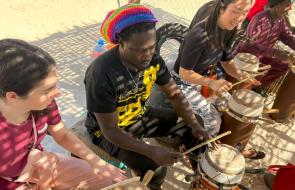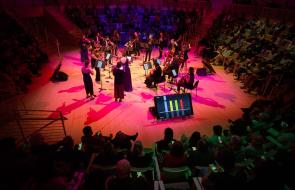October 8, 2016
Heply Digging Schuller by David Stevens
Friendship from two worlds lit up MIT’s packed but intimate Killian Hall Tuesday as “Streams of Expression
and Love: Joe Lovano Celebrates Gunther Schuller” emphasized the composer as jazz musician and collaborator. Having famously performed with Miles Davis on parts of Birth of the Cool, Schuller would go on to work with Eric Dolphy, Ornette Coleman, and Charles Mingus as a composer, arranger, and conductor. The collaboration between Berklee faculty member and acclaimed tenor saxophonist Lovano and musical polymath Schuller is one of those important links in the chain of the jazz collaboration, culminating in their Grammy-nominated 1994 album Rush Hour.
MIT Wind and Jazz Ensembles Director Fred Harris introduced the concert theme as Schuller’s “ability to bring musicians together.” More than just a genre, Third Stream advanced a sociological goal: to connect the players of the two disparate musical worlds. Throughout the night’s music and words we heard how Schuller’s musical mind and friendship deeply affected these musicians.
The first three works on the program were from composer and MIT faculty member Peter Child. The opening, “Moonsculptures”, constituted his “only true Third Stream piece.” Written for violinist Young-Nam Kim and Lovano, the three movements for violin, tenor sax, and piano (Eileen Huang) explore cross-influence and identity shifts. The opening movement featured Lovano playing on a Korean folk tune, in a nod to Kim’s heritage, while the last gives ideas from Lovano’s “Sculpture” to violin. The middle movement bridged those reflective outer movements with exciting canonic, merging, and interweaving lines among the trio.
“G.S. 75” and “G.S. In Memoriam” found Child meditating on the honoree’s life. A quick flash of gestures written for Schuller’s 75th birthday, “G.S. 75” uses a musical monogram on his initials (pitches G and E-flat) to create a bright and witty appreciation. “G.S. In Memoriam”, in contrasting character, was a reminder to many of our own grieving at the death of Schuller, last year. Premiered last November for the MIT Memorial Concert, “G.S. In Memoriam” was again performed by violinist Young-Nam Kim with his violist son, Daniel, who has recently joined the BSO. The work still carried somber weight; however, it now seemed to have a different, perhaps even resolutely celebratory meaning, almost a year later. In it the composer makes use of Schuller’s favorite twelve-tone row, the Magic Row (C#, D, G, B-flat, E, F, A, B, G-sharp, F-sharp, E-flat, C). It would play a crucial role in the rest of the concert. (I should warn that once you memorize the row, it may stay with you; one could hear fragments throughout the evening.)
The first half ended with an emotional solo by groundbreaking pianist Ran Blake. Entitled “For Gunther”, this composition reveals their deep connection. Memory seemed to be infused in the playing: one could perceive from a distance the almost six decades of friendship and collaboration. Like the other compositions, the work was a tribute in the artist’s own language. Blake’s preference for darkness during the performance led the audience toward their own musical associations with memories and time. Juxtaposing intimacy and expanse, the music paralleled many of Gunther’s own orchestration ideals.
In keeping with themes of remembrance, the second half of the concert started with a work composed by Lovano for this concert called “All Twelve”. Accompanied by the solid bass player Keala Kaumeheiwa and percussionist Fred Harris, Lovano freely explores different rows in gratitude for Schuller’s compositional language. The vast colors that the hyperactive Fred Harris drew from gongs, timpani, cymbals, and auxiliary instruments celebrated Schuller’s love for percussion (to confirm, listen to his composition Grand Concerto for Percussion and Keyboards).
Rush Hour, then transported transported us (minus cocktails) to the jazz club. Through the rest of the set, the lively atmosphere paraded the beauty that comes from comradery, blending the colors and genuine fun that the Joe-Gunther link produced. All but one of the six works were adaptations from Rush Hour on 23rd Sttreet. While the original ensemble included up to 23 members, the full configuration for the MIT performance employed a quintet of saxophone, bass, drums, vocalist, and cello. This reduction gave audience and performers intimate access to communications between and among timbres and voices.
“Angel Eyes” and “Prelude to a Kiss”, two iconic ballad arrangements by Schuller on Rush Hour, reveal his lush harmonic language. Heavily influenced by Ellington and Monk, the tinge of modern chromaticism heard in the accompaniment allowed Lovano the flexibility to venture into more remote “streams of expression.” With warmth and fluidity, he wove through the accompanying sounds and gestures of the ensemble. Judi Silvano, a renowned jazz vocalist and improviser, was wonderfully suited to tackle the demanding vocal part and convey the flute timbre. Cellist Katie McShane brought to life the string section and ebbed in and out of conversations with both Lovano and Silvano (who are married).
Between those two compositions came original tunes by Lovano and by Harris: “Juniper’s Garden” and “Joe on Gunther’s Magic Row”. In the former, the duo of Silvano and Lovano, accompanied loosely by Harris on drums, highlighted the ease of their melodic communication. One of the highlights of the concert was this spontaneous interaction of voice and saxophone, creating rapid imitative counterpoint and climaxing with a focused and gritty high dissonance. The evening ended with an upbeat “Topsy Turvy”, filled with exciting group improvisations surrounding that endearingly hummable melody.
The event reminded us of the fingerprint Schuller left on jazz and the importance of collaboration and cross-pollination among composer and performer, jazz and classical, future and past. The intimate friendships produced through some of those collaborations were vital. Whatever one postulates about the state of Third Stream as a genre, Schuller’s music remains active through many musical streams.
Read Review at The Boston Musical Intelligencer




